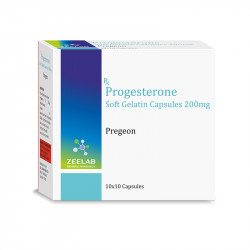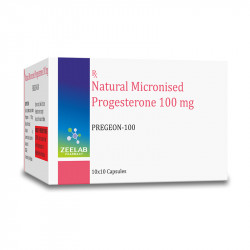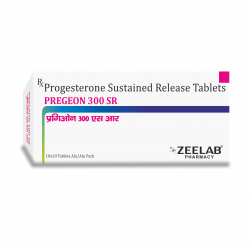Progesterone
Progesterone is a hormone naturally produced in the body, primarily by the ovaries, and plays a vital role in regulating various processes, including the menstrual cycle and pregnancy. It is often used in medicine as a hormone replacement therapy (HRT) or to treat certain conditions related to hormonal imbalances, such as irregular periods, infertility, or menopausal symptoms. Progesterone supplements can help maintain hormonal balance and support reproductive health in women.
Uses of Progesterone
- Used to treat irregular menstrual cycles or abnormal bleeding.
- Helps in hormone replacement therapy (HRT) during menopause.
- Supports fertility treatments and can be used to treat infertility.
- Helps prevent endometrial hyperplasia in women receiving estrogen replacement therapy.
- Used to maintain pregnancy in women with a history of recurrent miscarriages.
How Progesterone Works
Progesterone works by balancing the effects of estrogen, regulating the growth and shedding of the uterine lining. It helps prepare the uterus for pregnancy, supporting embryo implantation and early gestation. If pregnancy does not occur, progesterone levels drop, leading to menstruation. In hormone replacement therapy, progesterone counteracts the proliferative effects of estrogen on the endometrial lining, reducing the risk of endometrial cancer.
Benefits of Progesterone
- Regulates menstrual cycles and alleviates symptoms of irregular periods.
- Supports pregnancy and reduces the risk of miscarriage in certain cases.
- Effective in managing menopausal symptoms when used as part of HRT.
- Improves fertility in women with progesterone deficiency.
- Reduces the risk of endometrial cancer in women using estrogen therapy.
How to Take Progesterone
Progesterone is available in various forms, including oral tablets, creams, vaginal suppositories, and injectable solutions. The dosage and form of administration will depend on the condition being treated. It is important to follow the instructions provided by your healthcare provider to ensure proper use and effectiveness. For hormone replacement therapy or fertility treatments, your doctor will prescribe the appropriate dosage and duration.
Types of Dosage Available
- Progesterone 100 mg oral tablet
- Progesterone 200 mg oral tablet
- Progesterone vaginal suppositories (e.g., 100 mg, 200 mg)
- Progesterone injectable solution (e.g., 50 mg/ml)
- Progesterone cream (various strengths)
Side Effects of Progesterone
- Common side effects include headache, dizziness, and bloating.
- Fatigue or drowsiness may occur, especially when taking oral progesterone.
- Breast tenderness or changes in breast tissue.
- Spotting or breakthrough bleeding, particularly during the first few months of treatment.
- In rare cases, allergic reactions, including rash, itching, or swelling.
- Severe side effects may include blood clots, depression, or changes in mood.
Safety Advice
- Consult your healthcare provider before using progesterone if you have a history of blood clots, liver disease, or breast cancer.
- Use progesterone with caution if you are pregnant or breastfeeding, and only under medical supervision.
- Do not stop taking progesterone suddenly without consulting your doctor, especially if you are using it as part of hormone replacement therapy.
- Inform your doctor if you experience any unusual mood changes or symptoms of depression while using progesterone.
- Follow your doctor’s instructions regarding the proper use of progesterone to reduce the risk of side effects.
Frequently Asked Questions (FAQs)
Q: Can progesterone be used to delay periods?
A: Yes, progesterone can be used to help delay periods or regulate menstrual cycles, but it should only be done under the guidance of a healthcare provider.
Q: Is progesterone safe to use during pregnancy?
A: Progesterone is used to support pregnancy in women who have a history of miscarriage or are undergoing fertility treatments. However, it should only be used under a doctor's supervision during pregnancy.
Q: What are the common side effects of progesterone?
A: Common side effects include headaches, dizziness, breast tenderness, bloating, and fatigue. These effects are often mild and may improve with continued use.
Q: How long should I take progesterone?
A: The duration of progesterone treatment depends on the condition being treated. For hormone replacement therapy or fertility treatments, your doctor will provide a personalized treatment plan.
Download India's most affordable pharmacy app
- Compare with medicine prices
- Save upto 90% on your medicine bills

Temperature Controlled storage and delivery

Regular Sanitization

Disinfected Packaging

















 Added!
Added!